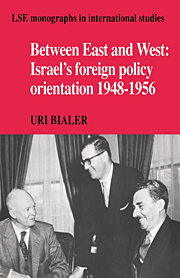Book contents
- Frontmatter
- Contents
- Acknowledgments
- INTRODUCTION
- Part I THE INTERNAL DIMENSION
- Part II RED STAR OVER ZION
- 3 “LET MY PEOPLE GO”
- 4 THE ALIYAH TIE WITH MOSCOW
- 5 THE EASTERN EUROPEAN ARENA
- 6 TRADE WITH THE SOVIET UNION
- 7 POLITICAL COOPERATION
- 8 THE MILITARY DIMENSION
- Part III THE WESTERN CONNECTION
- EPILOGUE: “A people that dwells alone”?
- Appendix 1 U.N. voting record
- Appendix 2 Biographical notes
- Appendix 3 Israel's votes at the U.N.
- Index
- LSE MONOGRAPHS IN INTERNATIONAL STUDIES
7 - POLITICAL COOPERATION
Published online by Cambridge University Press: 24 November 2009
- Frontmatter
- Contents
- Acknowledgments
- INTRODUCTION
- Part I THE INTERNAL DIMENSION
- Part II RED STAR OVER ZION
- 3 “LET MY PEOPLE GO”
- 4 THE ALIYAH TIE WITH MOSCOW
- 5 THE EASTERN EUROPEAN ARENA
- 6 TRADE WITH THE SOVIET UNION
- 7 POLITICAL COOPERATION
- 8 THE MILITARY DIMENSION
- Part III THE WESTERN CONNECTION
- EPILOGUE: “A people that dwells alone”?
- Appendix 1 U.N. voting record
- Appendix 2 Biographical notes
- Appendix 3 Israel's votes at the U.N.
- Index
- LSE MONOGRAPHS IN INTERNATIONAL STUDIES
Summary
Russia's policy towards Israel between 1948 and the 1956 Sinai Campaign have been skillfully analyzed in two valuable works: Ya'acov Ro'i's Soviet Decision-Making in Practice – The U.S.S.R. and Israel 1947–1954 (London, 1980) and Arnold Krammer's The Forgotten Friendship (Illinois, 1974). Both books have clarified the ergonometrics of the various Soviet moves and the dynamics in the development of Russian policy. The present book aims to broaden the scope of discussion. As a preliminary to that task, I will briefly outline the main points of the development of Soviet political support for Israel in the international arena during this period.
Formal Russian involvement in the Palestinian problem commenced on 27 April 1947, when Great Britain officially requested that the Secretary General of the United Nations place the topic on the agenda of that body. Three weeks later, Gromyko enunciated Russia's official position. Addressing the U.N., he declared that if it were not possible to create a bi-national Arab–Jewish state in Palestine, the Soviet Union would support partition of the country into two independent halves. Primary among Russian interests in this position was the desire to eject Great Britain from the Middle East; potentially, at least, support for a Jewish state assured her of a political presence in the region. Russian policy was confirmed on 11 October 1947, when the U.S.S.R. officially stated that she supported the United Nations Special Committee on Palestine (U.N.S.C.O.P.) Partition Plan and when she voted in favor of partition in the General Assembly on 29 November 1947.
- Type
- Chapter
- Information
- Between East and WestIsrael's Foreign Policy Orientation 1948–1956, pp. 133 - 172Publisher: Cambridge University PressPrint publication year: 1990

